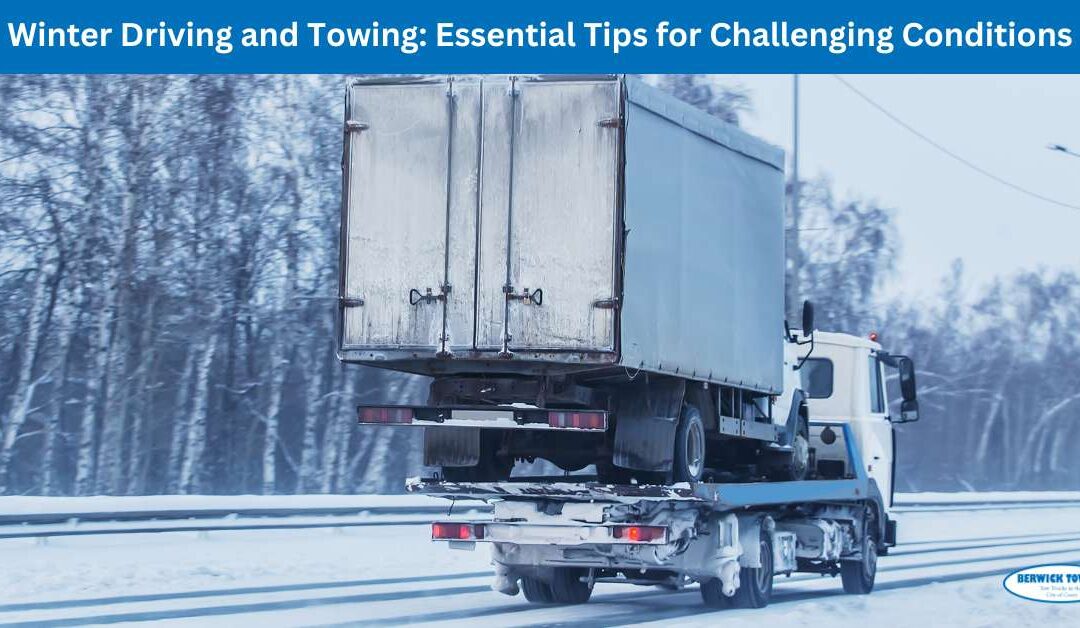Winter driving poses unique challenges, and when towing is involved, the complexities increase. Icy roads, snow-covered highways, and frigid temperatures can make towing during the winter a daunting task. This article provides essential tips to ensure safe and successful winter driving and towing experiences.
Check Weather and Road Conditions:
Before embarking on a winter towing journey, check weather forecasts and road conditions. Stay informed about potential storms, icy patches, or snow-covered roads. Planning your route based on current conditions will help you anticipate challenges and make informed decisions during the trip.
Use Winter Tires:
Equip your towing vehicle and trailer with winter tires designed to handle cold temperatures and icy surfaces. Winter tires provide improved traction and control, reducing the risk of skidding or sliding, especially when towing heavy loads.
Inspect Your Towing Equipment:
Before heading out in winter conditions, thoroughly inspect all towing equipment. Ensure that the hitch, safety chains, and trailer lights are in proper working order. Cold temperatures can affect the performance of mechanical parts, so a careful inspection is crucial.
Carry Emergency Supplies:
Pack a winter emergency kit that includes essentials like blankets, extra clothing, non-perishable food, water, a flashlight, and a first aid kit. Additionally, carry tools and equipment necessary for minor vehicle repairs, such as a tire jack, jumper cables, and a shovel.
Slow Down and Increase Following Distance:
Reduce your speed when towing in winter conditions. Snow and ice make roads slippery, and sudden maneuvers can lead to loss of control. Increase your following distance to allow for safe braking and maneuvering, giving yourself ample time to react to unexpected situations.
Be Mindful of Trailer Sway:
Winter winds and slippery roads can exacerbate trailer sway. Be extra cautious and adjust your driving speed to minimize sway. If you feel the trailer starting to sway, avoid sudden movements and gently correct your course.
Brake Strategically:
Use your brakes judiciously in winter conditions. Apply them gently to avoid skidding, and engage the trailer brakes (if equipped) appropriately. If your vehicle has an anti-lock braking system (ABS), be aware of its function and let it do its job in preventing wheel lock-up during braking.
Clear Snow and Ice:
Before setting out, ensure that your vehicle, trailer, and all lights are free of snow and ice. Clearing these surfaces enhances visibility for you and other drivers on the road. Pay attention to your vehicle’s roof, as accumulated snow can slide onto the windshield during braking.
Monitor Fluid Levels:
Cold temperatures can affect fluid viscosity. Check and maintain proper levels of engine oil, transmission fluid, and windshield washer fluid. Using winter-grade fluids can improve the performance of your vehicle in cold weather.
Plan for Stops and Breaks:
Winter driving requires additional focus and can be physically demanding. Plan for more frequent stops and breaks to rest, stay warm, and assess road conditions. This also allows you to clear snow and ice from your vehicle and trailer.
Conclusion:
Winter driving and towing demand heightened awareness, preparation, and caution. By following these essential tips, you can navigate challenging winter conditions safely and ensure that your towing experience remains smooth and incident-free. Remember, taking the time to prepare and adapt to winter challenges is a small investment in the safety of yourself and others on the road.
If you are in Officer, Victoria 3809, and looking for a car removal service, this is the best way to visit us.
Contact Us
Berwick Towing & Transport
27B William Rd
Berwick VIC 3806
(03) 7035 7815
https://berwick-towing.com.au/

